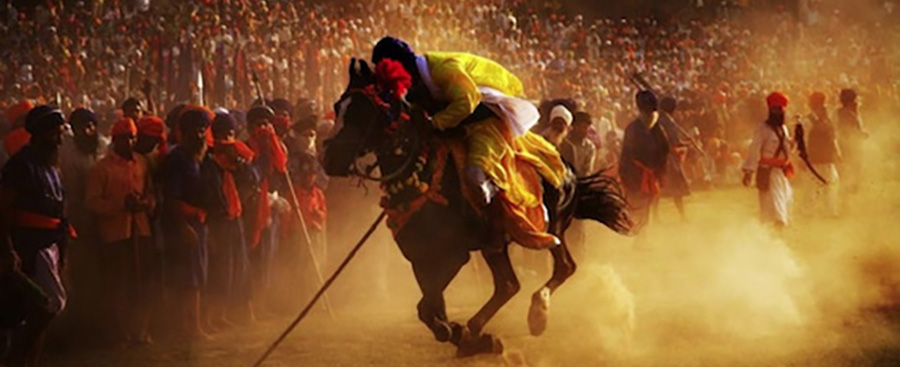
 Holla Mohalla is a Sikh festival celebrated in the month of Phalguna , a day after Holi.An annual festival held at Anandpur Sahib in Punjab, Hola Mohalla was started by the tenth Sikh Guru, Gobind Singh, as a gathering of Sikhs for military exercises and mock battles on the day following the festival of Holi. It reminds the people of valour and defence preparedness, concepts dear to the Tenth Guru who was at that time battling the Mughal empire. On this three-day festival mock battles are held followed by music and poetry competitions. The Nihang Singhs (members of the Sikh army that was founded by Guru Govind Singh) carry on the martial tradition with mock battles and displays of swordsmanship and horse riding. They perform daring feats, such as Gatka (mock encounters), tent pegging, bareback horse-riding and standing erect on two speeding horses.
Holla Mohalla is a Sikh festival celebrated in the month of Phalguna , a day after Holi.An annual festival held at Anandpur Sahib in Punjab, Hola Mohalla was started by the tenth Sikh Guru, Gobind Singh, as a gathering of Sikhs for military exercises and mock battles on the day following the festival of Holi. It reminds the people of valour and defence preparedness, concepts dear to the Tenth Guru who was at that time battling the Mughal empire. On this three-day festival mock battles are held followed by music and poetry competitions. The Nihang Singhs (members of the Sikh army that was founded by Guru Govind Singh) carry on the martial tradition with mock battles and displays of swordsmanship and horse riding. They perform daring feats, such as Gatka (mock encounters), tent pegging, bareback horse-riding and standing erect on two speeding horses.
There are also a number of durbars where Sri Guru Granth Sahib is present and kirtan and religious lectures take place. Sporting shining swords, long spears, conical turbans, the Nihangs present a fierce picture as they gallop past on horseback spraying colors on people.On the last day a long procession, led by Panj Pyaras, starts from Takth Keshgarh Sahib, one of the five Sikh religious seats, and passes through various important gurdwaras like Qila Anandgarh, Lohgarh Sahib, Mata Jitoji and terminates at the Takth.
For people visiting Anandpur Sahib, langars (voluntary community kitchens) are organized by the local people as a part of sewa (community service). Raw materials like wheat flour, rice, vegetables, milk and sugar is provided by the villagers living nearby. Women volunteer to cook and others take part in cleaning the utensils. Traditional cuisine is served to the pilgrim who eat while sitting in rows on the ground
The tenth guru Gobind Singh felt that Holi, had lost its original meaning over the years. It was no longer a celebration to reaffirm fraternity and brotherhood. In 1757 AD he decided to revive the spirit of Holi and weave its essence into a festival created in the Khalsa traditions. Holla Mohalla is celebrated in the month of Phalguna a day after Holi. 
Early morning prayers at the gurdwaras mark the beginning of the festival. The Guru Grantha Sahib is brought out with ceremony and placed on the dais. It is given a symbolic bath with milk and water. Akhandapathas, Kar seva, Shabads and Kirtans are performed The Karah Prasad is distributed to the congregation, after it has been consecrated by the guru. At noon, men and women from all castes and creed eat together at the guru ka langar.
Stories are narrated about the bravery of Guru Govind Singh in prose and verse. Tribute is also accorded to Guru Har Gobind, who led his army to free 52 captive kings from the Gwalior jail in 1612 AD.
Colorful processions are organized on Holla Mohalla. Sikhs, especially the Nihangs, dressed in their traditional martial costumes, display their skills in archery, sword fencing, horse riding and shooting. Battles are enacted and ancient cannons fired to focus on the training required for war.
Holla Mohalla is an occasion for the Sikhs to reaffirm their commitment to the Khalsa Panth
Celebration of Holla Mohalla
Holla Mohalla is celebrated to reaffirm fraternity and brotherhood and reminding people of “valour and defence preparedness”, concepts very dear to the Tenth Guru of the Sikhs, Guru Gobind Singh ji.
Colorful processions are organized on the occassion of Holla Mohalla, particularly in Anandpur Sahib and Muktsar(both in Indian Punjab). Sikhs, especially the Nihangs, dressed in their traditional martial costumes form part of the pageant.
Mock battles are also held followed by music,poetry and other competitions. The Nihang Singhs (members of the Sikh army founded by Guru Govind Singh) portray their skills with mock battles and displays of swordsmanship and horse riding. The Nihang Singhs also perform daring feats, such as Gatka (mock encounters), tent pegging, bareback horse-riding and standing erect on two speeding horses.
Recently, the Indian Goverment had accorded Holla Mohalla the status of a ” National Festival”.